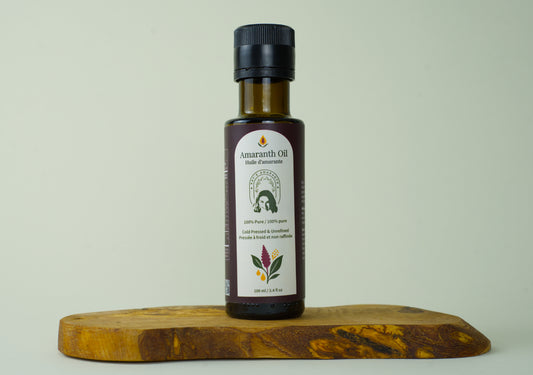
Amaranth Oil Benefits: Gut, Heart & Skin Health Backed by Science
Amaranth oil – pressed from the seeds of the ancient amaranth grain – is gaining attention for its impressive health benefits. This natural oil is beloved by health-conscious consumers for being both friendly to the gut and supportive of cardiovascular wellness. In this article, we highlight some of the strongest amaranth oil benefits supported by science, including improved gut health, a high content of squalene, and other unique nutritional properties. Amaranth has long been considered a nutrient-packed “superfood,” and modern research confirms that it’s rich in bioactive compounds like squalene and antioxidants that contribute to its functional health properties pmc.ncbi.nlm.nih.gov. What follows is a friendly, evidence-based look at how amaranth oil can boost your well-being (with full references to scientific studies), and a hint at even more amaranth health benefits on the horizon.
Heart Health and Cholesterol Management
One of the most notable benefits of amaranth oil is its positive impact on heart health. Amaranth oil is naturally high in unsaturated fatty acids (about 75–77% of its fats), which are the heart-healthy kind lipidworld.biomedcentral.com. Replacing saturated fats with these healthier oils can help support cardiovascular wellness. More uniquely, amaranth oil is exceptionally rich in squalene, a plant compound that appears to reduce cholesterol production in the body by inhibiting HMG-CoA reductase (the same liver enzyme targeted by certain cholesterol-lowering drugs) mdpi.com. This biochemical action helps explain why studies have observed significant cholesterol reductions with amaranth oil. For example, in one animal study, hamsters on a high-cholesterol diet experienced a 15% drop in total cholesterol and a 22% drop in “bad” non-HDL cholesterol when 5% amaranth oil was added to their feed lipidworld.biomedcentral.com. Similarly, a clinical trial in humans found that incorporating amaranth oil into a heart-healthy diet led to significant decreases in blood cholesterol levels – total cholesterol fell by up to ~20% and LDL (“bad”) cholesterol by up to ~25% in the amaranth oil group pmc.ncbi.nlm.nih.gov. By helping to manage cholesterol and improve lipid profiles, amaranth oil shows real promise as a heart-healthy addition to one’s diet.
Supporting Gut Health and Digestion
Intriguingly, amaranth may also support a healthy gut, which is a foundation for good digestion and immunity. While amaranth oil itself doesn’t contain fiber, studies on amaranth grain products suggest they can act as prebiotics that nourish beneficial gut bacteria. Research indicates that amaranth consumption can positively modulate the gut microbiota – the community of microbes in our digestive system – in ways that benefit our health. In a recent pilot trial, undernourished children who received popped amaranth daily showed a restoration of a healthier gut bacterial balance pmc.ncbi.nlm.nih.gov. The abundance of bacteria linked to inflammation and colitis dropped, while levels of helpful probiotic species (like Lactobacillus and Bifidobacterium) increased pmc.ncbi.nlm.nih.govpmc.ncbi.nlm.nih.gov. Animal studies mirror these findings: amaranth supplementation in mice has been shown to reverse unhealthy shifts in the gut microbiome caused by a high-fat diet, essentially supporting gut health even under poor dietary conditions mdpi.com. A thriving gut microbiota is associated with better digestion, nutrient absorption, and even mood and immune function, so these early findings hint that amaranth oil – as part of a balanced diet – could contribute to a happier, healthier gut.
Nutrient-Rich Profile and Antioxidant Power
Amaranth oil’s nutritional profile sets it apart from many other oils. Roughly three-quarters of its fat content is unsaturated fat, predominated by linoleic acid – an essential omega-6 fatty acid that our bodies need for proper nutrition lipidworld.biomedcentral.com. It also contains a good portion of oleic acid (the same heart-healthy fatty acid found in olive oil) and even a small amount of alpha-linolenic acid (an omega-3 fatty acid), giving it a favorable balance of fats lipidworld.biomedcentral.com. But what truly makes amaranth oil special is its high squalene content. Amaranth oil is one of the richest plant-based sources of squalene, containing roughly 6–8% squalene by weight sciencedirect.com – far more than what’s found in olive oil or most other cooking oils. Squalene is not only beneficial for cholesterol control, as mentioned above, but also acts as an antioxidant in the body. In addition, amaranth oil provides vitamin E in the form of tocotrienols, along with other natural antioxidant compounds. (Amaranth grain is known to contain tocotrienols and flavonoid antioxidants that carry over into its oil lipidworld.biomedcentral.compmc.ncbi.nlm.nih.gov.) These nutrients give amaranth oil a notable antioxidant capacity to neutralize free radicals and reduce oxidative stress. Indeed, laboratory research confirms this antioxidant power: in one study, amaranth oil supplementation protected rats’ livers from toxin-induced oxidative damage, showing a clear hepatoprotective (liver-protecting) effect ffhdj.com. This means the oil helped prevent cellular injury in the liver by quenching free radicals and supporting the body’s natural defense systems. The combination of essential fatty acids, high squalene, and vitamin E makes amaranth oil a nutritional standout with the potential to combat oxidative stress and inflammation in the body.
Emerging Benefits and Future Outlook
Beyond the well-established perks for heart and gut health, ongoing research suggests that amaranth oil may offer even more health benefits. Scientists are exploring a range of additional therapeutic effects – and while this research is still emerging, the results are exciting. Early studies indicate that amaranth oil and its extracts could have anti-inflammatory properties and may help in reducing chronic inflammation markers in the body mdpi.com. There are also hints at benefits for metabolic health: components in amaranth might aid in blood sugar regulation and weight management, as suggested by some animal and cell studies mdpi.com. Thanks to its high squalene and antioxidant content, amaranth oil has drawn interest for skin health as well. Preliminary experiments have shown that amaranth seed oil can protect skin cells from UV-induced damage and even promote wound healing in cell cultures mdpi.com – echoing traditional uses of amaranth in skincare. Additionally, researchers are investigating potential anti-cancer effects of amaranth’s bioactive compounds, with some early findings suggesting it could help inhibit the growth of certain cancer cells or bolster the body’s resistance to toxins mdpi.com. While many of these findings are not yet conclusive, they underscore the remarkable range of health areas that amaranth oil might influence.
Friendly note: The science on amaranth oil is evolving quickly. What we’ve discussed here are the core, strongest benefits backed by current studies – heart health, gut health, and a powerhouse of nutrients like squalene – but this is likely just the beginning. Amaranth oil appears to be a true multi-tasker in the realm of natural health. Researchers are continuing to unveil new aspects of this oil’s benefits, from inflammation modulation to potential impacts on the immune system and more. In future articles, we’ll dive deeper into these amaranth health benefits as more evidence comes to light. For now, incorporating this ancient grain’s oil into a balanced diet (for example, drizzling it on salads or using it in low-heat cooking) could be a simple way to embrace its science-backed advantages. With its unique nutritional profile and growing list of potential uses, amaranth oil is earning its place as a modern functional food – and it’s definitely worth keeping an eye on for even more benefits to be uncovered in the near future.

